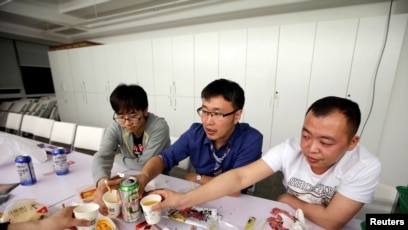In a society where success requires extremely long working hours and faced with a high cost of living and unaffordable housing prices, many young Chinese are “hovering” in a sign of discouragement, veiled by the general spirit of the pursuit of success .
“Hover” has become a popular term to indicate that the individual has decided not to change his personal situation: he will not get married, have children or strive for career growth, as explained by the Chinese online forum, Zhihu.
Movement tang ping follows the principle of minimum effort in life, sufficient to maintain the existing lifestyle. Those who embrace this movement see it as a way to counter the “9-6-6 practice” of working from 9 a.m. to 6 p.m., six days a week, a schedule widely practiced in the high-tech sector. which has now spread to other sectors of the Chinese economy, although in many cases even working long hours and shortening weekends is not enough to move forward in a country where the cost of living is becoming increasingly high.
Chinese authorities have expressed concern about the “hover” trend as the leadership in Beijing has long seen the ambition of educated youth to move forward as a factor for social stability, according to the China Daily.
During the coronavirus pandemic, young graduates in 2021 are competing with 2020 graduates who have yet to find work, according to the South China Morning Post.
The post-pandemic recovery appears to be reopening jobs for manual workers, according to The New York Times. For this reason, many educated young people see no real reason to do anything but “hang on”.
“I graduated two years ago from one of the best universities in Nanjing in the field of architecture, but I did not find a job and that is why I am here,” said Zhang, 24, who lives in a rural area of Sishuan province. He spoke to VOA’s Chinese-language service, provided he did not identify himself by full name in order to avoid attention.
Zhang says many of his friends who graduated with him have not yet settled in big cities so they “return to their hometowns either sick from the hard work they have done, or with a mountain of debt.”
It is a choice
From the beginning I decided that I would “stay suspended”. In big cities it is very difficult to buy an apartment and a car, or to meet someone with whom you will marry, have children, raise them with all the requirements and courses and education that is required, ”he says. . “So I decided that what I really needed to do was learn how to do it right.”
The term “hover” first appeared in March on the Tieba online forum on Chinese online search platform Baidu. An anonymous user had written “Suspended is Justice” explaining how he could make a happy life in China newly graduated in 2019 with a salary of only 777 dollars, according to Chinese media portal China Banking News.
“Stay / lie indoors or out, like stray dogs and cats. I choose this way because I can no longer stand the stress. The author of the post did not specify how much salary he received, but added that he did small, casual jobs and spent about $ 32 a month. He did not elaborate on the cost of housing, but many young Chinese live with their parents until they get married.
Government response
By the end of May, the Chinese government began to oppose these theories. “China is in one of the most important stages of its national renaissance. Young people are the hope of the country. Neither their personal situation nor that of the country will allow them to remain “collectively suspended,” a May 28 editorial in the Global Times, a Chinese Communist Party-controlled magazine quoted by the Hong Kong South daily, said. China Morning Post.
Analysts say the “pending” stems from a lack of opportunity to move forward. Those born in the ’50s,’ 60s and ’70s took advantage of Ten Xiaoping’s policies of 1978 – a series of reforms that transformed the economy and opened the country to foreign investment. The reforms paved the way for China’s economic rise and the birth of global giants such as Huawei and Alibaba.
China at the time embraced the policy of “letting some people get rich,” Xie Fei, a presenter on the Broadcasting Network and a commentator on Chinese television in Zhejiang, told VOA.
“But the current generation has not encountered the same opportunities as their parents to achieve class climbing. “So there is no hope that they will have a bombastic fortune like the previous generation.”
According to 2017 statistics from the Chinese Academy of Social Sciences, Chinese under the age of 35 face problems from employment in temporary, irregular jobs with lower wages. Lin Thung-Hong, a researcher at the Institute of Academic Sociology in Taiwan, says this results to some extent from the economic slowdown of 2015-2016. Studies show that young people find it more difficult to find work.
“China’s economic development has slowed down and young people are being offered fewer opportunities,” he said. “These tendencies not to try hard to succeed reflect the general economic climate in the country,” he told VOA’s Mandarin in Chinese.
‘Unjustifiable’
When new graduates find work, many are under pressure to work long hours. Lucy Li, 35, works in the banking sector in Beijing. She wants to introduce herself under the pseudonym that she worries she might be targeted for revenge by the boss.
“I know that the practice of 9-6-6 work (work from 9 am to 6 pm, six days a week) is widely practiced in the technology sector, but now it has spread to other sectors as well,” she told Zëri e America, Service in the Mandarin dialect of the Chinese language. “At the bank where I work, executives come for an unannounced check-up at 8pm to see who is still in office and the employees who are at work are the ones who grow in responsibility.”
“As a result, we all work 12 hours a day. “But this is unaffordable,” she said.
Another young man, identified as Wang, says he quit his job at tech giant Alibaba because he often started work at 7am, returned home at 7pm and returned to the office around 9pm after putting the children to sleep. indicates that he often worked until midnight or maybe 2-3 after midnight, especially during periods when they were coming up with a new product. He asked VOA reporters to quote him only by last name, as he would not attract attention.
“It has become a work culture. “Many of us work in jobs that we enjoy, but if you work 24 hours a day, non-stop all week, your desire will run out.”
In 2019, Jack Ma, founder of tech giant Alibaba, said on Chinese social media platform Weibo that “those who manage to work on the 9-6-6 model are blessed.”
“If you do not work from 9 in the morning until 6 in the evening for six days in a row when you are young, when will you work? “If you are in a job that you like, it is not a problem at all that it works 9-6-6,” he said, in a comment that resonated loudly and was followed by strong criticism. He then deleted the comment.
Work culture 9-6-6 has led to death. This phenomenon was first recorded in Japan where it was identified with the term karoshi. In 2018 Japan passed a law on workplace reform, limiting the excessive number of working hours.
Earlier in the year in China, the deaths of two workers on the Pinduoduo digital platform for selling agricultural products sparked debate over disastrous working hours. Many young people commented on social media expressing dissatisfaction with 9-6-6 work practice and expressing preference for a life with less stress.
On May 28, the social media platform Weibo conducted a survey with its users on the preference to “stay afloat”. Of the 241,000 respondents, 43% were fully in favor of this trend, 31% said they were somewhat supportive and 18% said they would like to “stay afloat” but had a lot of responsibility on their shoulders.
About 80% of the 850 million Weibo platform users are 17-33 years old, according to the company’s own statistics.
Authorities in Beijing are concerned about the popularity of this lifestyle idea, as it runs counter to the Chinese dream as defined by President Xi Jinping. In 2012, Mr. Xi spoke of the “Chinese dream” shortly after he became leader of the Communist Party of China, saying that China must “work to achieve the Chinese dream of a great rebirth of the Chinese nation.”
The Global Times quotes Chinese sociologists and educators as saying that the younger generation is more selfish and fragile in the face of pressure than previous generations. “Instead of working guided by the virtues of hardship, sacrifice, perseverance and coping with stress, they prefer to ‘stay afloat’ to find spiritual peace,” the article said.
China’s official Xinhua news agency wrote in an editorial in late May that “the suspension is embarrassing. “Only by working hard can happiness be achieved.”
Mr. Lin, with the Chinese Academy of Social Sciences says that the lack of satisfactory progress in Chinese economy, society and politics has led to general stagnation in the national advancement system. Without social progress, there is no “Chinese dream”.
“People are hanging on. The place is in dreams. “It’s all pretty ironic,” he told VOA’s Chinese Service.






